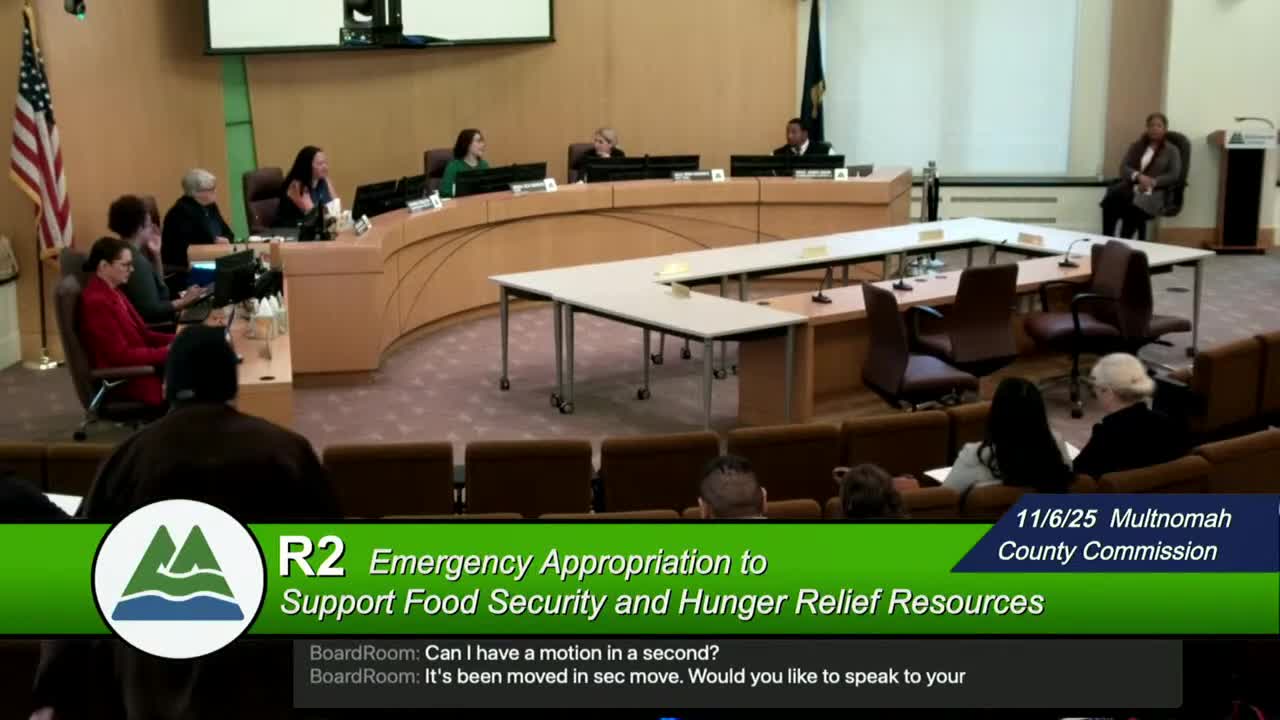Multnomah County approves $100,000 emergency fund for food security as SNAP benefits lapse
Get AI-powered insights, summaries, and transcripts
Subscribe
Summary
Multnomah County commissioners voted 5–0 on Nov. 5 to transfer $100,000 from general fund contingency to support food security and hunger relief as federal SNAP benefits remained suspended.
Multnomah County commissioners voted 5–0 on Nov. 5 to transfer $100,000 from general fund contingency to support food security and hunger relief as federal SNAP benefits remained suspended.
The board’s budget modification, brought by Commissioner Susheela Moyer, proposed directing $75,000 to the Oregon Food Bank for rapid wholesale purchases and distribution and reserving $25,000 for district-directed distributions to community partners identified by commissioners. Moyer told colleagues that the county’s emergency operations center had assessed partner needs and that monetary support would enable organizations to stretch purchasing power and obtain culturally specific foods. “SNAP is absolutely a lifeline for families in Multnomah County,” Moyer said during her presentation.
Commissioners debated a late amendment from Commissioner Brim (Brehm) Edwards that would have earmarked $62,000 for SUN School pantry sites to keep five sites open and increased the district-directed pot. Supporters of the amendment argued it would more directly prevent local pantry closures; procurement and emergency-management staff warned that changing allocation pathways would raise questions about supplier setup and might require a temporary procurement exemption in order to get funds out quickly.
Multnomah County emergency-management staff and Oregon Food Bank representatives told the board that a quick transfer to the Oregon Food Bank would allow food to get into the community fast and that the Food Bank can accept county direction about prioritization. Jen Turner, associate director of partnerships and programs at Oregon Food Bank, told the board the agency’s Multnomah County network reported 710,000 pantry visits between July 2024 and June 2025 and was already seeing increases in demand of 25% to more than 100% at some sites. Turner said the Food Bank works with hundreds of culturally specific and neighborhood-based partners that can be prioritized through the contract.
Procurement staff said the county already has an existing contract vehicle with Oregon Food Bank that could receive additional funding quickly; setting up new suppliers would take longer because of vendor onboarding (W-9s and banking information). The county’s purchasing manager said a temporary procurement exemption could be used to accelerate distribution if needed, but that documentation would be required to show the emergency justification.
The board conducted a roll call on a proposed amendment and after votes the amendment failed. After additional public testimony and staff answers about contract flexibilities and reporting, the board approved the underlying $100,000 modification with direction for departments to use existing contracting mechanisms where possible and to require reporting on distribution metrics such as quantity of food and households served.
Commissioners and staff emphasized the action was intended to be a rapid, targeted bridge, not a substitute for state or federal benefits. County staff said they would cut a check to the Oregon Food Bank as soon as the next day and that the Food Bank had agreed the funds could be used to serve Multnomah County residents. Commissioner Moyer and emergency operations staff said the county would continue to monitor gaps and could return with further requests if the need persisted.
What’s next: County staff will use the existing contract with Oregon Food Bank for rapid distribution and work with commissioners’ offices to allocate district-directed dollars; staff also said they would document procurement exemptions and require reporting back to the board on how the funds were used.
Votes at a glance: The board rejected an amendment that would have restricted a larger share of funds to SUN School sites (roll-call vote on the amendment failed). The board then approved the $100,000 emergency appropriation by roll call, 5–0.
Attributions: Quotes and factual descriptions in this story are drawn from public testimony and staff presentations on Nov. 5, 2025.
